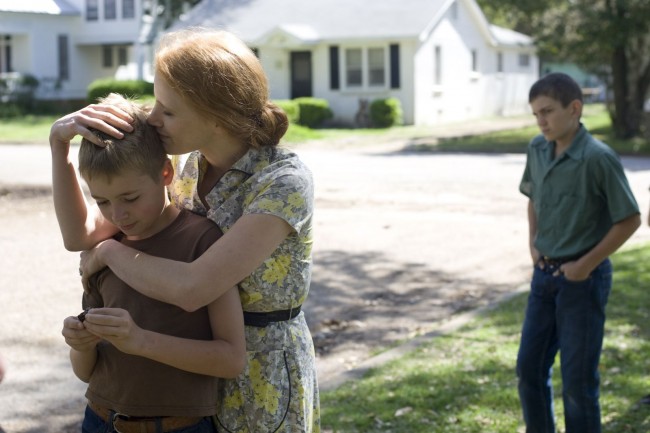The Tree of Life
Mostly Sean Penn Free

Starring: Brad Pitt, Hunter McCracken
Review by Robert Patrick
Terrence Malick doesn’t work in simply one medium, he paints, molds, sculpts, grafts, and chisels his way to the finish line with his camera. But is the finish line ever really drawn in his pictures? The director has no use for pacing, and often times kicks the conventionality with the toe of his boot as he strolls, blithely, along a forlorn and foliage-laden path. Malick longs, insatiably, for the journey. I can imagine the filmmaker’s hands being dusted with eraser shavings and oil paint. There have been so many words slung from the pens of film journalists everywhere, prompting discussion about the asocial auteur, that it’s almost a moot point to review one of his films. Every intellectual with a working thumb has stirred around a gumbo of ideas when dissecting the director’s catalog of films. Reviewing Malick’s “The Tree of Life” is a difficult if not altogether impossible task. The film is going to mean something very different to everyone, depending on their life experiences, so it is, ultimately, purely hubris to judge how a stranger would feel at the end of this whirling phantasmagoria of color and sound. Appropriate for star ratings this movie is not. Malick gives you malleable shapes, boundless open spaces, ephemeral and detached voices that lace an auditorium’s speakers. Malick asks that the audience look at this canvas of nonlinear speckles of light and narrative, comb them furtively, and absorb them emotionally so that they unlock the moving Rorschach that is his film.
The picture, when looked upon through an opaque lens, is about a family, living in 1950s suburban Texas, that deals with problems that aren’t necessarily atypical of a common household: kids defy their parents, absolve rationality in order to test the water of their mortality, et al. The problems with the adults are generally planted in the soil of monetary issues and power struggles. All of these imbroglios are slowed down, even dyed, to show the melody in their discord. Malick makes an argument sound as primal and as beautiful as a Brahms composition (there is more than just allusions to this, as Malick provides the film’s father character with a love for all things classical). Brad Pitt, who plays Mr. O’Brien, the father of the Texan family, has a jaw as rigid as the ones on Mount Rushmore, eyes carved out of determination and hidden regret, and wrinkles that look of road maps to his forgotten dreams. He is a fragile man with proud ideas.
But the movie is truly about liquid poetry. Through the aching summer, hot wind gusts the kitchen curtains softly, making the flowing fabric resemble jellyfish. When slivers of light pierce through the trees, only to land on the street below, they look of makeshift sheet music to a concerto never played. When Malick is behind the camera, something as seemingly insignificant as soap bubbles in dishwater can look as intimidating as the asteroid belt. There is so much beauty in a film that reverberates with doom: there is arson in every touch and acridity in every embrace. Malick’s film plays like a hazy memory forever lodged between remembrance and disappearance. The narrative deviates in some places – and I wont divulge how and why – but it’s better to be caught off guard by the picture than it is to perforate the mystery.
As with all of Malick’s pictures, “The Tree of Life” is about landscapes. No other director, since Kubrick, has captured isolation and warmth with such clarity. Images in this film feel new and yet tarnished, and it’s somehow reminiscent of a baseball card that’s folded into the spokes of a child’s bicycle: the fluttering is somewhat unnerving and yet simultaneously comforting, much like the dreamlike tenacity of the movie itself. Many questions are posited in this film, and much like in life, none of them are really answered. Malick’s films require that you reflect on answers never given. Sometimes reality is only an outline of the intangible, I feel like Malick says with all of his movies, and it’s hard to disagree.
